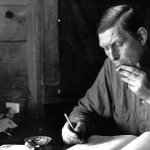I
O Ye young and thoughtless youth,
Come seek the living god,
The scriptures are a sacred truth,
Ye must believe the word.
Eccl. xii. 1.
II
Tis God alone can make you wise,
His wisdom’s from above,
He fills the soul with sweet supplies
By his redeeming love.
Prov. iv. 7.
III
Remember youth the time is short,
Improve the present day
And pray that God may guide your thoughts,
And teach your lips to pray.
Psalm xxx. 9.
IV
To pray unto the most high God,
And beg restraining grace,
Then by the power of his word
You’l see the Saviour’s face.
V
Little children they may die,
Turn to their native dust,
Their souls shall leap beyond the skies,
And live among the just.
VI
Like little worms they turn and crawl,
And gasp for every breath.
The blessed Jesus sends his call,
And takes them to his rest.
VII
Thus the youth are born to die,
The time is hastening on,
The Blessed Jesus rends the sky,
And makes his power known.
Psalm ciii. 15.
VIII
Then ye shall hear the angels sing
The trumpet give a sound,
Glory, glory to our King,
The Saviour’s coming down.
Matth. xxvi. 64.
IX
Start ye saints from dusty beds,
And hear a Saviour call,
Twas a Jesus Chirst that died and bled,
And thus preserv’d thy soul.
X
This the portion of the just,
Who lov’d to serve the Lord,
Their bodies starting from the dust,
Shall rest upon their God.
XI
They shall join that holy word,
That angels constant sing,
Glory, glory to the Lord,
Hallelujahs to our King.
XII
Thus the Saviour will appear,
With guards of heavenly host,
Those blessed Saints, shall then declare,
Rev. i. 7, 8.
XIII
Then shall ye hear the trumpet sound,
The graves give up their dead,
Those blessed saints shall quick awake,
And leave their dusty beds.
Matth. xxvii. 51, 52.
XIV
Then shall you hear the trumpet sound,
And rend the native sky,
Those bodies starting from the ground,
In the twinkling of an eye.
I Cor. xv. 51, 52, 53, 54.
XV
There to sing the praise of God,
And join the angelic train,
And by the power of his word,
Unite together again.
XVI
Where angels stand for to admit
Their souls at the first word,
Cast sceptres down at Jesus feet
Crying holy holy Lord.
XVII
Now glory be unto our God
All praise be justly given,
Ye humble souls that love the Lord
Come seek the joys of heaven.
Hartford, january 1, 1782.



















Comment form: